Das Hinzufügen des Disqus-Kommentarsystems ist eine großartige Möglichkeit, die Einschränkungen des Standard-WordPress-Kommentarsystems zu überwinden.
Hier ist der Grund: Die Verwaltung von Kommentaren auf einer WordPress-Website kann schnell überwältigend werden, insbesondere wenn Spam Ihr Dashboard verstopft. Das Standardsystem funktioniert zwar, aber es fehlt an fortschrittlichen Moderationstools und interaktiven Funktionen, die ein sinnvolles Engagement fördern.
Disqus ist eine der beliebtesten Kommentarplattformen und bietet eine schlanke Oberfläche, Diskussionsstränge und Anmeldeoptionen für soziale Medien.
Und in dieser Anleitung zeigen wir Ihnen, wie Sie Disqus ganz einfach zu Ihrer WordPress-Website hinzufügen können.

Sollten Sie Disqus mit WordPress verwenden?
Disqus ist eines der beliebtesten Kommentarsysteme von Drittanbietern, die für Benutzer von WordPress verfügbar sind. Neben seiner Benutzerfreundlichkeit und den Optionen zur individuellen Anpassung bietet es auch eine Drittanbieter-Hosting-Plattform für die Speicherung und Verwaltung von Kommentaren.
Da Disqus Kommentare auf einem vom WordPress-Hosting getrennten Server verarbeitet, kann die Verwendung von Disqus die Gesamtleistung Ihrer Website verbessern. Deshalb verwenden viele Benutzer von WordPress Disqus als Alternative zum Standard-WordPress-Kommentarsystem.
Allerdings ist Disqus nicht das beste Kommentarsystem, das wir ausprobiert haben. Es hat uns zwar bei der Leistung unserer Website geholfen, aber wir waren keine Fans seiner Moderationsfunktionen und es fügte ohne unsere Erlaubnis Affiliate-Links zu unseren Inhalten hinzu.
Nachdem wir Disqus deaktiviert hatten, konnten wir feststellen, dass sich die Anzahl der kommentierten Beiträge deutlich erhöhte. Mehr über unsere Erfahrungen können Sie in unserer Disqus-Bewertung lesen.
Ob Sie Disqus oder andere Plattformen verwenden, bleibt natürlich Ihnen überlassen. Aber wenn Sie auf der Suche nach Disqus-Alternativen sind, dann haben wir einige Empfehlungen.
Welches WordPress-Kommentarsystem sollten Sie anstelle von Disqus verwenden?
Nach dem Ausprobieren verschiedener Kommentar-Plugins haben wir festgestellt, dass Thrive Comments die beste Disqus-Alternative ist.
Thrive Comments ist ein All-in-One-Kommentar-Plugin mit einer einfach zu bedienenden Benutzeroberfläche, die sowohl für Blogging-Anfänger als auch für Experten geeignet ist. Weitere Details finden Sie in unserem Testbericht über die Thrive Themes-Suite, der einen Abschnitt speziell über Thrive Comments enthält.

Neben den Funktionen zur Verwaltung und Moderation von Kommentaren können Sie Thrive Comments nutzen, um das Engagement der Nutzer mit Post-Kommentar-Aktionen zu steigern. Nachdem der Nutzer einen Kommentar hinterlassen hat, können Sie ihn zu verwandten Beiträgen oder einer benutzerdefinierten Dankesnachricht mit einem kostenlosen Geschenk weiterleiten.
Außerdem können Sie “Likes” und “Dislikes” sowie “Upvotes” und “Downvotes” hinzufügen, um die Interaktion des Publikums in Ihrem Kommentarbereich zu fördern. Außerdem können Sie den Kommentatoren Benachrichtigungen senden , wenn ihr Kommentar beantwortet wird.
Wenn Thrive Comments nicht Ihren Anforderungen entspricht, dann können Sie auch unsere vollständige Liste der besten WordPress-Plugins zur Verbesserung von Kommentaren ansehen.
Wenn Sie immer noch an der Verwendung von Disqus interessiert sind, machen Sie sich keine Sorgen. Wir erklären Ihnen, wie Sie das Disqus-Kommentarsystem-Plugin hinzufügen können. Sie können die Quicklinks verwenden, um zu den einzelnen Abschnitten zu springen:
Lassen Sie uns gleich loslegen!
Schritt 1: Erstellen Sie ein Disqus Konto
Der erste Schritt zur Installation von Disqus-Kommentaren in WordPress besteht darin, ein Disqus-Konto zu erstellen. Dazu müssen Sie auf die Disqus-Website(disqus.com) gehen und sich dort anmelden.
Sobald Sie das getan haben, sollten Sie die folgende Seite sehen. Klicken Sie einfach auf “Ich möchte Disqus auf meiner Website installieren”.
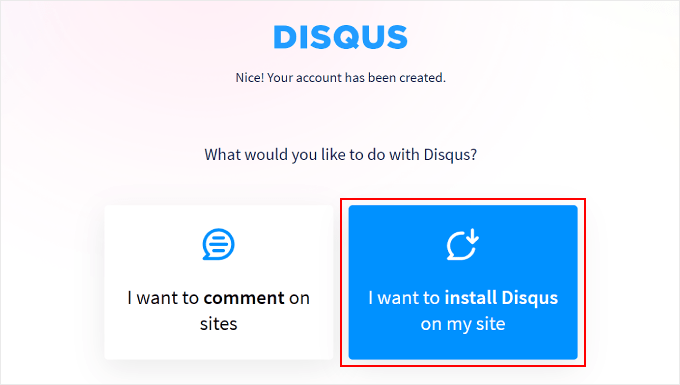
Auf der nächsten Seite müssen Sie die Details für Ihre neue Disqus-Website eingeben, auf der Sie alle Ihre Disqus-Kommentare verwalten werden. Dazu gehören Website-Eigentümer, Website-Name und Kategorie.
In das Feld “Website-Name” können Sie die gewünschte Disqus-Subdomain eingeben. Danach klicken Sie einfach auf “Website erstellen”.
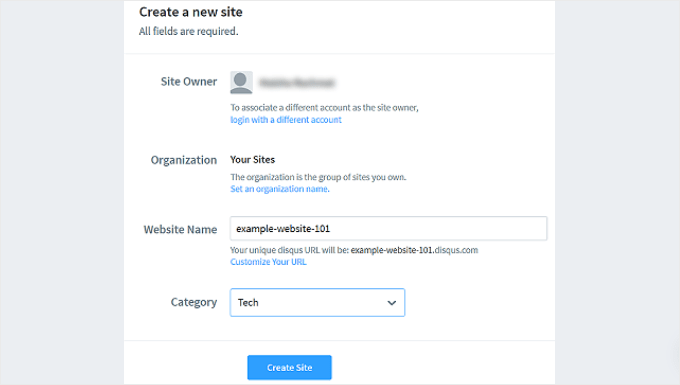
Sie gelangen nun auf das Dashboard der Disqus-Website.
An dieser Stelle müssen Sie sich für einen der Disqus-Pläne entscheiden, um das Kommentarsystem in WordPress einrichten zu können. Wenn Sie noch nicht sicher sind, welches Sie verwenden sollen, können Sie mit dem kostenlosen Basic-Plan beginnen.

Sie werden nun aufgefordert, eine Plattform zu wählen.
Wählen Sie einfach “WordPress”, um fortzufahren.
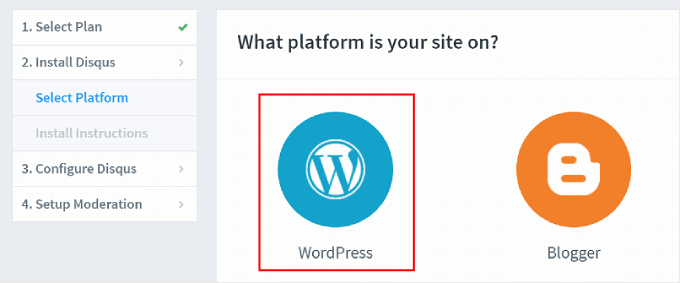
Sie sehen nun die WordPress-Installationsseite.
Hier sollten Sie sich das Feld “Installation Token” merken, das für die spätere Einrichtung nützlich ist.
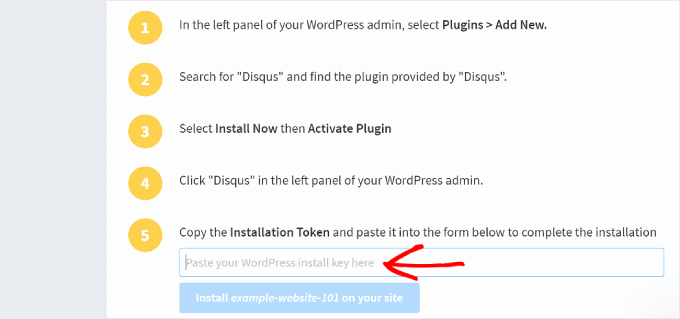
Sie können diese Registerkarte geöffnet lassen, während Sie mit den nächsten Schritten fortfahren.
Schritt 2: Installieren Sie das Disqus Kommentar System Plugin
Nun können Sie Ihr WordPress-Dashboard öffnen, um das Disqus Comment System Plugin zu installieren. Eine Schritt-für-Schritt-Anleitung finden Sie in unserer Anleitung zur Installation eines WordPress-Plugins.
Danach gehen Sie in Ihrem WordPress-Dashboard zum Disqus-Menü. Klicken Sie dann unter “Haben Sie ein Disqus-Konto?” einfach auf “Ja”.
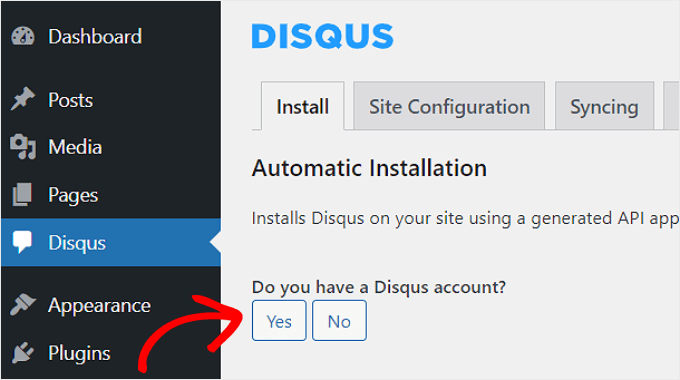
Sie werden nun die Frage sehen: “Haben Sie eine bei Disqus registrierte Website, die Sie nutzen möchten?
Wählen Sie “Ja”.
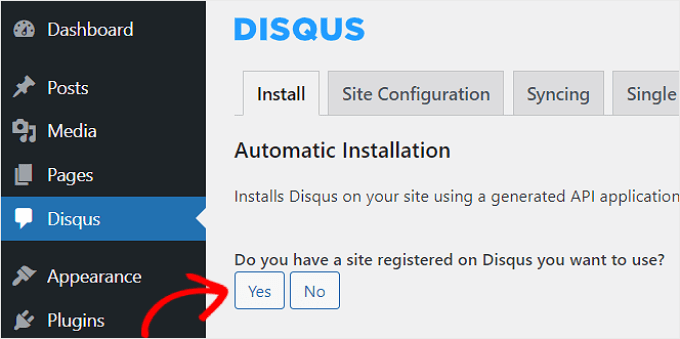
An dieser Stelle werden Ihnen einige WordPress-Installationsanweisungen und ein zu kopierendes Sync-Token angezeigt.
Klicken Sie hier auf die Schaltfläche “Kopieren”.
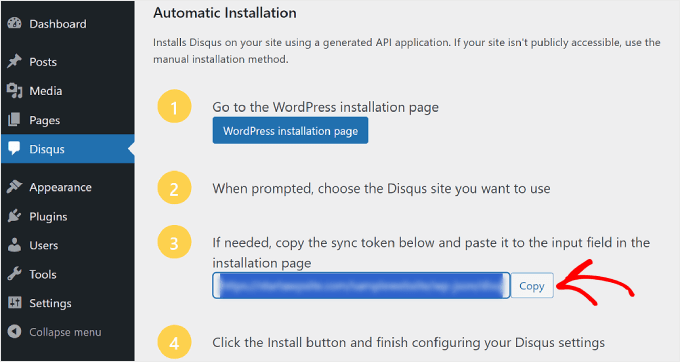
Kehren wir nun zur Disqus-Website zurück.
Hier müssen Sie das Token, das Sie gerade aus dem WordPress-Dashboard kopiert haben, in das entsprechende Feld einfügen.
Dann können Sie auf die Schaltfläche “Installieren Sie [Name der Disqus-Website] auf Ihrer Website” klicken und unten auf “Konfigurieren”.
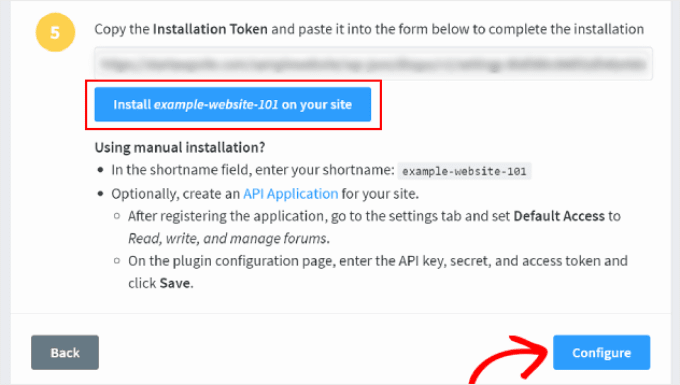
Und das war’s!
Wenn Sie das Disqus-Menü in Ihrem WordPress-Dashboard aktualisieren, sollten Sie nun eine ähnliche Oberfläche wie diese sehen:
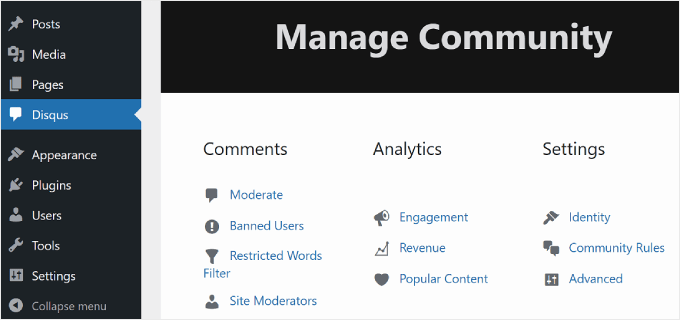
Nun wollen wir sehen, ob Disqus erfolgreich in Ihrem Kommentarbereich aktiviert wurde.
Öffnen Sie einfach einen WordPress-Blogbeitrag im Frontend und scrollen Sie bis zu den Kommentaren. So sollte es aussehen, wenn die Installation korrekt durchgeführt wurde:
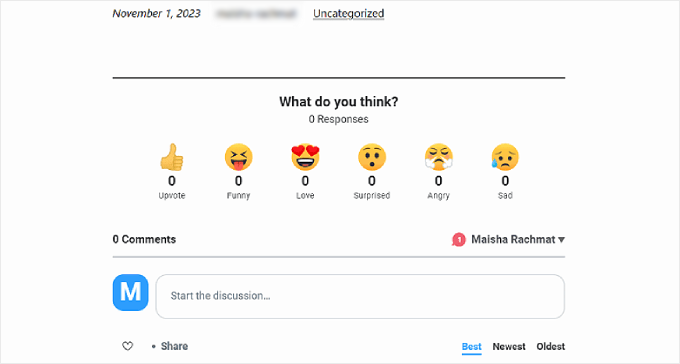
Schritt 3: Importieren und Exportieren älterer WordPress Kommentare in Disqus
Sobald Sie das Disqus-Kommentarsystem installiert haben, wird es die nativen WordPress-Kommentare auf Ihrer Website übernehmen. Mit anderen Worten: Die auf Ihrer WordPress-Website gespeicherten Kommentare werden für die Nutzer nicht mehr sichtbar sein.
Um dies zu beheben, müssen Sie alle vorhandenen Kommentare in das Disqus-Kommentarsystem importieren. Gehen Sie im WordPress-Verwaltungsbereich auf die Einstellungsseite des Disqus-Plugins, scrollen Sie nach unten und navigieren Sie zur Registerkarte “Synchronisierung”.
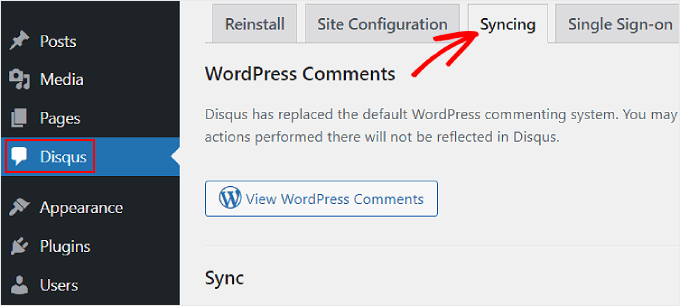
Dann scrollen wir nach unten und wählen “Kommentare importieren”.
In der Tabelle unten sehen Sie, welche Ihrer Kommentare erfolgreich importiert wurden.
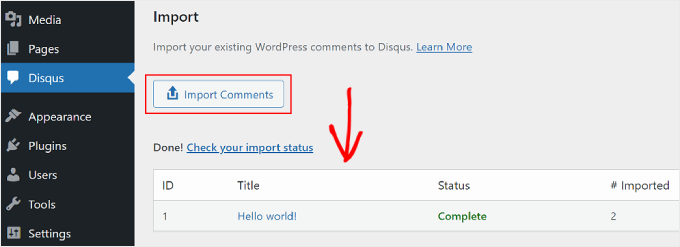
Wenn Sie über benutzerdefinierte Beitragstypen verfügen, kann es vorkommen, dass Ihre älteren Kommentare nach der Umstellung auf Disqus nicht mehr angezeigt werden. Um dies zu beheben, müssen Sie Disqus für benutzerdefinierte Beitragstypen deaktivieren.
Eine praktische Anleitung finden Sie in unserem Artikel über die Deaktivierung von Disqus in benutzerdefinierten Beitragstypen.
Moderieren und Konfigurieren von Disqus-Kommentaren
Wenn Sie Kommentare mit Disqus moderieren möchten, können Sie auf der Seite des Disqus-Plugins auf die Schaltfläche “Moderieren” klicken.
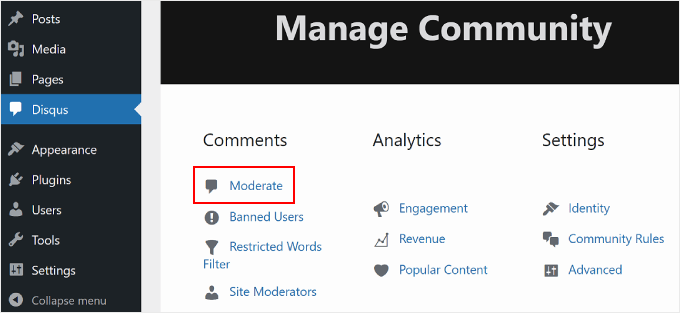
Dies bringt Sie zur Moderationsseite auf der Disqus-Website.
Wenn Sie mit der WordPress-Kommentarseite vertraut sind, wird die Navigation auf der Disqus-Seite kein Problem sein. Hier können Sie Kommentare genehmigen, löschen oder als Spam markieren.
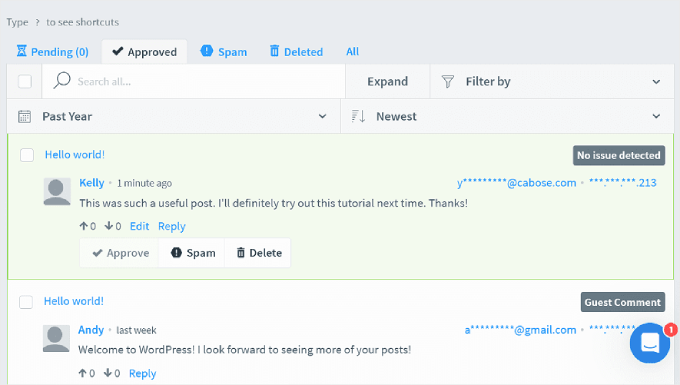
Tipps und Tricks zur WordPress-Kommentarmoderation finden Sie in den folgenden Artikeln:
- Anleitung für Anfänger zum Moderieren von Kommentaren in WordPress
- Wie man Blog-Benutzern erlaubt, Kommentare in WordPress zu moderieren
- So erlauben Sie Benutzern, ihre Kommentare in WordPress zu bearbeiten
Problembehandlung für die Anzeige von Disqus-Kommentaren
Bei einigen WordPress-Themes kann der Disqus-Kommentarbereich breiter als der Rest des Beitragsbereichs erscheinen. Um dies zu beheben, müssen Sie einige benutzerdefinierte CSS in das Stylesheet Ihres Themes oder Child-Themes einfügen.
Sie können zwar benutzerdefinierte CSS über den Editor der Themadatei hinzufügen, aber wir empfehlen dies nicht. Die Nachverfolgung von Änderungen wird dadurch erschwert und es wird unklar, welcher Code aus dem Theme stammt und welcher benutzerdefiniert ist.
Stattdessen empfehlen wir die Verwendung von WPCode, dem einfachsten Code-Snippets-Plugin. Damit können Sie sicher benutzerdefinierten Code auf Ihrer WordPress-Website hinzufügen und verwalten. Wenn der Code nicht funktioniert, können Sie das Snippet innerhalb des Plugins einfach entfernen.
Den Code, den Sie hinzufügen müssen, finden Sie unten:
1 2 3 4 | #disqus_thread { margin: 0 auto; max-width: 650px;} |
Dieses CSS setzt die maximale Breite des Kommentarbereichs auf 650 Pixel und zentriert ihn auf dem Bildschirm. Ihr Theme kann eine andere Breite haben, so dass Sie es an Ihre Bedürfnisse anpassen müssen.
Eine Schritt-für-Schritt-Anleitung finden Sie in unserem Leitfaden zum einfachen Hinzufügen von benutzerdefiniertem CSS zu Ihrer WordPress-Website.
So sollte es bei WPCode aussehen:
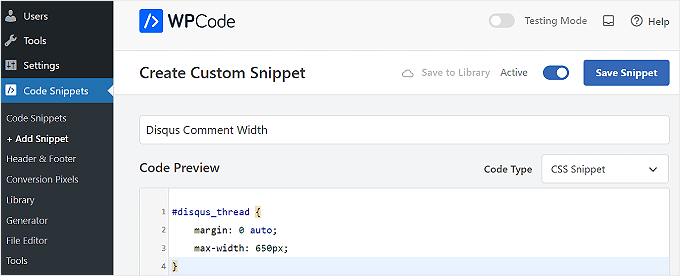
Erfahren Sie mehr darüber, wie Sie Ihre WordPress Kommentare verwalten können
Die Verwendung von Disqus ist nur eine Möglichkeit, Ihre WordPress Kommentare zu verwalten. Hier finden Sie weitere Anleitungen, um die Beteiligung an Ihren Kommentaren zu verbessern:
- Wie man Benutzern erlaubt, unangemessene Kommentare in WordPress zu melden
- Installation und Einrichtung von Facebook Kommentaren in WordPress
- Seitennummerierung von Kommentaren in WordPress (Schritt für Schritt)
- Hinzufügen von Videos und mehr in WordPress-Kommentaren mit oEmbed
- So erlauben Sie Benutzern, ihre Kommentare in WordPress zu bearbeiten
- Wie man das WordPress-Kommentarformular gestaltet (ultimative Anleitung)
- Wie man eine Dankes-E-Mail an Blog-Kommentatoren in WordPress sendet
Wir hoffen, dass dieser Artikel Ihnen geholfen hat zu lernen, wie Sie das Disqus-Kommentarsystem in WordPress hinzufügen können. Vielleicht möchten Sie auch unseren Leitfaden zum Einfügen oder Begraben von Kommentaren in WordPress und unsere Expertenauswahl für die besten Plugins zur Verbesserung von WordPress-Kommentaren lesen.
Wenn Ihnen dieser Artikel gefallen hat, dann abonnieren Sie bitte unseren YouTube-Kanal für WordPress-Videotutorials. Sie können uns auch auf Twitter und Facebook finden.





Aaron Jane
Hello,
I’m getting lot of spams on my site with the default comment system, though I have akismet installed. Thought about using Disqus, but I see that Disqus is no longer used by wpbeginner. Can you share why you moved away from disqus ?
Thanks Aaron.
WPBeginner Support
Here is why we switched away from Disqus.
Admin
Theo
Thanks a whole lot for this post. I’ve decided to start using disqus for some of the same reasons you mentioned here. This was helpful!
Mohammed Haseeb
Okay. I know Disqus is good but I have a question. Is there a way to remove hyperlinks from profile names of people commenting on my blog posts. Here is the link to my blog
AlleXyS
Hello … I tried some days to activate disqus on my website. CAN’T , due of a issue in database…. I install disqus (plugin) => comments => disqus => tell me to upgrade my DATABASE !! I click UPGRADE, but nothing happening, my website tell me that this page can’t be found .. So, I think the script can’t run
here I can’t arrive : http://cdn2.wpbeginner.com/wp-content/uploads/2014/04/disqus-signin.png
WPBeginner Support
Please contact Disqus support they would be better able to help you with that.
Admin
WPBeginner Staff
Disqus.
Adjie Al-Faruq
how to fix “unable to connect to the disqus api servers”
Bora M. Deniz
Hi, very simple expression and useful article. I’m between jetpack plugin and disqus system .Which one is the more useful for visitors and further SEO of website ?
Santhosh Veer
when i try to import the worpdress comments i show error please help me to fix this
Andreia Franco
I have disqus on my blog for a couple of months, since then I just have received lots of spams and disqus doesn’t work at all. I see disqus on other wordpress blogs and it seem to work very well. I do not know what to do with mine. I always go back to moderate and try to activate it but it doesn’t work, still. Do you have any suggestions?
couture31
SOOO glad to have you all as a resource! I have transitioned to a self-hosted WP site and I visit your site daily for tips! Thanks for your help and patience…the step by step directions are awesome!! So grateful!
WPBeginner Staff
Edit the post and make sure comments are enabled for that post. Also go to Settings > Discussion and make sure that the box next to ‘Automatically close comments on articles older __ days’ is unchecked.
UgochukwuEmmanuelAgbams
Thanks for this tutorial. I have earlier registered on disqus, installed and activated the plugin, but ny problem now is, at the footer of my blog post after disqus, I have a report that says, ‘comments are closed’, and another issue is, disqus does not sync with my loged in users. What should I do about this?
Kerryvaaine
It is available as a plugin in wordpress.
Neal Umphred
My experience trying to get Disqus onto my site does not resemble anything like what you have written above. It’s an hour later and I can’t get anything happening . . .
Teresa Robeson
I sympathize because it is the same for me. There is no “plugins” link on my admin page, nor is there any option for adding Disqus (or anything else) under the Comments link. Maybe it’s because I’ve only got a free WP site, but I didn’t have this much trouble installing Disqus on my Blogger site. There are days I really hate WordPress.
I hope you got it figured out since you posted 2 weeks ago.
Dennis
I personally have used jetpack comments for comment on site to handle spam. Most persons I have noticed are usually uncommon with the disqus concepts and dislike the sign up process, very few notice the ‘guest’ option. But I’m looking into using Vanilla comments by integrating vanilla forums into my wordpress website and keep the comment actions completely under my control simples like a good option to me so far from testing.
Aaron Aarons
I don’t have my own blog but I regularly post comments to blogs that use Disqus. Quite frankly, there is so much I dislike about Disqus that I would never use it, without major future improvements, in a blog I had any control over.
1) Comments either don’t show up at all in Google searches on phrases within them, or they show up as part of the page of the particular commenter’s Disqus comments, rather than as part of the page they comment on.
2) If I save a web page that has Disqus comments, the comments are not saved with the page, and the ability to retrieve the comments depends on the future maintenance of such comment threads by Disqus.
3) I can save a page with comments as a PDF, but then the information about the precise date and time of a comment can no longer be seen even by a mouse-over (nor by looking at the non-existent source), so all one sees is how many days, weeks, months or years before the time the page was saved the comment was posted. This makes it impossible to follow the chronology of a discussion.
4) In one case, a blogger lost his domain name and had to get a new, different one. Since then, the old pages can be accessed with the new domain name, but the old comments do not show. There is a way to get to the original comment thread, but it’s not accessible to the casual user.
There are other, less serious, annoyances, that have slipped my mind for the moment.
If I am wrong about any of the items I had listed as problems above, I’d like to know.
Earl Henson
I wonder if Google traffic is lower than it would be if comments don’t show in Google? And of course comments would be the same with Disqus but wouldn’t they become higher over time as more people discover this blog? But if NEW users can’t discover this blog because the comments are not Google searchable…..
Codex73
Recently installed “Disqus Comment System” WordPress plugin, it displays correctly and accepts comments. When I reply through the Dashboard, these won’t show on thread. Should replies be handled directly in the Disqus thread instead?
Bricky
Is there a way to display a number in front of each comment using disqus?
Metal Mofos
What about SEO?
Dave
Even with Disqus, the comments are fully indexed along with the page. Do a View Source of this page to see for yourself.
Rob Orr
That’s not necessarily true. It’s possible that Google will index your comments, but I’ve seen many more that are not indexed as opposed to those that are.
WPBeginner Staff
We wrote about this plugin in our guide on how to add Google+ comments in WordPress.
Animish
Thanks for this useful article. But there is one question stuck in my mind. Does Disqus affect the load time of posts? Because it uses iframe to load comments. Didi you notice any difference?
Jeanz
Hello Syed. What you think about this plugin? – WordPress Comments Evolved – that allow to display G+ comments, FB comments, WordPress and Disqus. I can’t find any useful review in google search, thanks
Mehmet Fatih Yorulmaz
I have two problems about Disqus (which I already use):
First, it does not allow me to convert my commenters to subscribers by adding a checkbox to the bottom of the comment box. Normally, I was using Mailchimp Comment Optin plugin for this. Also, it does not work with “Comment Redirect by Yoast” plugin…
Second problem is, Subscribe button is difficult to notice for inexperienced commenters. In wordpress comment box, the simple checkbox for subscribing to the replies was very easy to notice. Also, guest commenters are by default subscribed to all comments. And they are not given option to subscribe to “only replies”. Last, but not least, the word “subscribe” is very ambigious. What is it? Subscribe to my site, subscribe to my newsletter or subscribe to the comments?…
Third issue is, language support. My site is in Turkish and I can select Disqus interface to be in Turkish. But, when my not English speaking visitor hits “Subscribe”, they are sent an English confirmation email. Or when they wanna edit their subscription preferences, again they are being forwarded to an all Engish page.
I appreciate your thoughts on these issues…
Thanks
WPBeginner Staff
Manuel, we haven’t noticed any decline in the number of comments we receive on WPBeginner.
Manuel Echeverry
its true but there a some WP pages that claim that have to disable disqus because the visitors dint like it. I personaly use Disqus in my site and have no bat experiences until now, but its something that we have to pay attention
Manuel Echeverry
I love disqus but the are some people that claim is hard to use por the blog visitors making you lose commenters, wath do you know about that
WPBeginner Staff
No actually the number of comments is nearly the same as before. There is less spam though.
Gagan Masoun
Now, you are also getting too many comments after adding Disqus comment system…
khoaplus
Disqus can not be integrated with CommentLuv
Muhammad Tahir
Thanks your articles are awesome
Golam Rabbani
I am going to add disqus in my blog. I think it can help me to avoid spaming comment. Thanks for your nice tips.
WPBeginner Staff
Please clear your browser cache or try in a different browser.
WPBeginner Staff
Andor, we checked the plugin with floating social bar. Both plugins are working as expected. Are you its Disqus causing the issue?
Andor Nagy
Pretty sure. For me it isn’t floating neither here nor on my website. I maybe caused by browser cache.
WPBeginner Staff
We will try to look into this in some future article. Meanwhile you may contact disqus support they may already have a solution for this.
Nicolas Messer
Could you maybe just go into some more details regarding custom post types…I was searching for a solution how to get previously made comments on a CPT into disucss but didn’t have any luck and read in the other post that you ran into that same issue as well. Thanks a lot!
Peder B. Helland
Very nice article! I love Disqus – it both works and looks great.
Andor Nagy
Thanks for the tutorial! Unfortunately if you install the plugin, the floating social bar won’t float anymore.
WPBeginner Staff
No it does not.
Lại Đình Cường
Does Disqus make my blog slow?
WPBeginner Staff
Yes you should activate sync Disqus with WordPress.
vinod
Thank you for the article.
I have more than 75000 (75k) comments and I am unable to import them to disqus from my wordpress site. It would be great if you can explain how large number of comments can be imported and integrated seamlessly between wordpress and disqus.
Thanks a lot.
WPBeginner Staff
No you don’t need Akismet anymore.
WPBeginner Staff
Disqus improves page speed which is good for SEO. When a user leaves a comment on your blog you can get their email from the Disqus admin page.
bouncedancer
Thank you for this very informative article. You guys epitomize what’s great about the internet.
Abhisek Padhi
Disqus was important for Wp-Beginner To Scale up. I wasn unable to properly implement disqus SSO (Single sign on) feature. First I requested disqus to enable the SSO for my site, then i created an application, copied the api keys to my disqus plugin. Added logo’s. Now when a user tries to use SSO in disqus comments a login windows opens and if he/she is a new user, he/she register’s then log in. Here the problem arises, after logging in, the window must close automatically and the user should be redirected to the page from which he left, unfortunately the login windows don’t dissapear, rather it log’s into WordPress dashboard, which is very undesirable behavior. They (disqus) recommend using window.close() javascript, but i couldn’t figure out how to use and where. See, if you could help. This solution will help a lot of wordpress users using disqus.
WPBeginner Staff
We will try to look into it.
kathir
Hi sir, I would like to know disqus affects seo and when a user registers can I get their info like email id and name etc ?
Declan Wilson
Do we still need to use Akismet to filter spam or can we cancel it if we move over to Disqus?
Jesse Brede
Yeah, I use Disqus on any site that has an active community. The lack of visual control is a bit frustrating, but like iOS, the uniform layout is an advantage as more sites adopt it.
OtakuPT
One question, “Synk Disqus with wordpress” should i activate this option
or not?
I make this question because of SEO, if i activate this option the comments appear in the source code of the page, if i don’t activate the comments do not appear in the source code.
How does this interfere with search engine optimization? And what is the better option?
Best regards
Luca Rosaldi
I love Disqus. One huge upside for the end users is that they are automatically updated whenever someone replies to a comment, in an unobtrusive way. It’s like a digital hub for comments.
Jay Castillo
I also started to use Disqus late last year because of comment spam (I get about 50 to 100 each day even with GASP and commentluv), and switching to Disqus really helped. I then noticed that even Pat Flynn started using it on SPI (also because of comment spam), and now WPBeginner. Makes me feel I made the right choice.
One more advantage with Disqus is registered users can go back and edit their comments just in case of wrong spelling/grammar, etc.
By the way, thanks for the tip on how to prevent Disqus from overriding the comment count. I didn’t know there was a way to do that until now, and I can’t wait to try it out. Thanks for sharing!
RW
thanks for this post. I haven’t used it before but I’m going to give it a shot. I appreciate you posting these kind of topics.